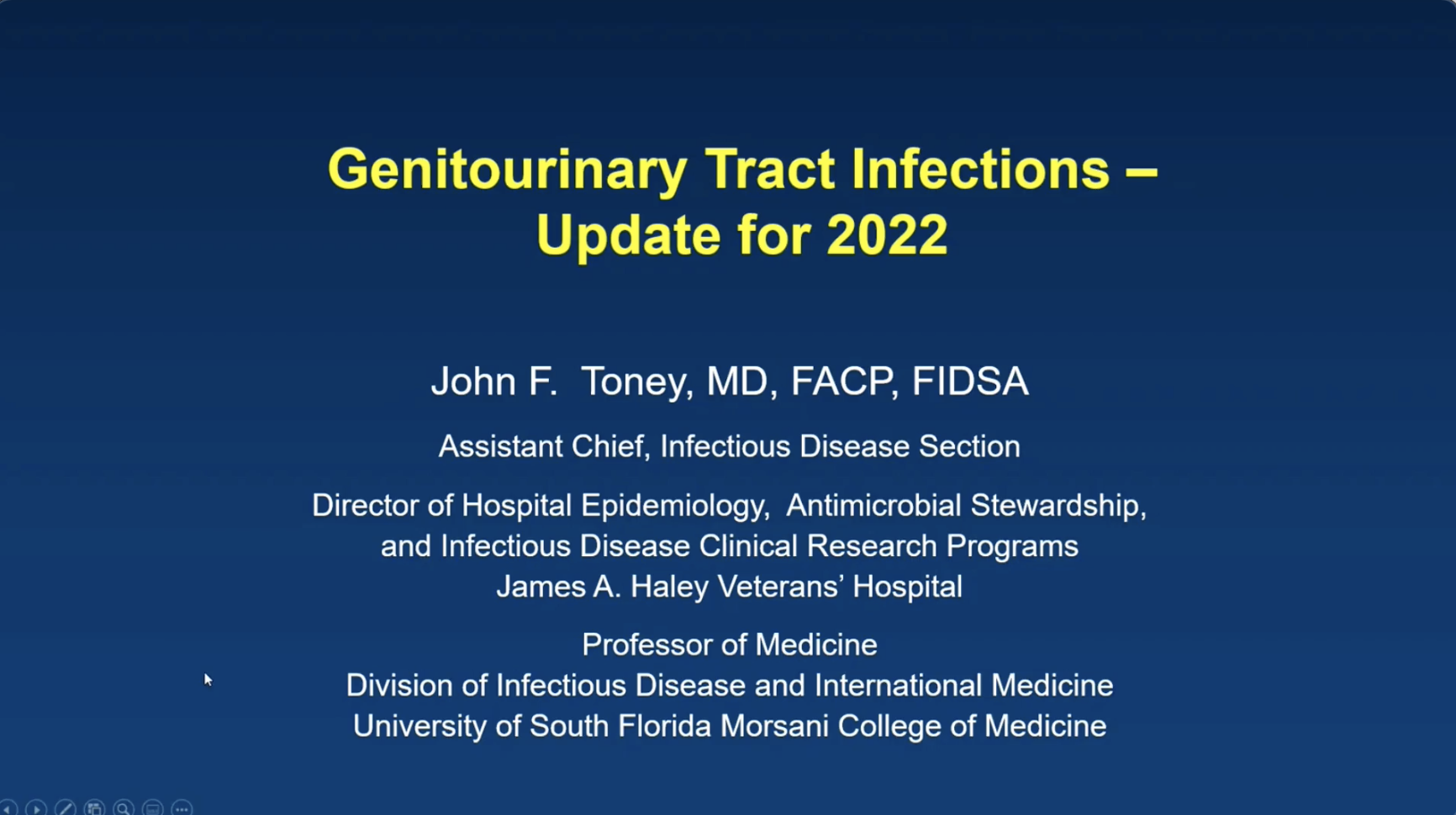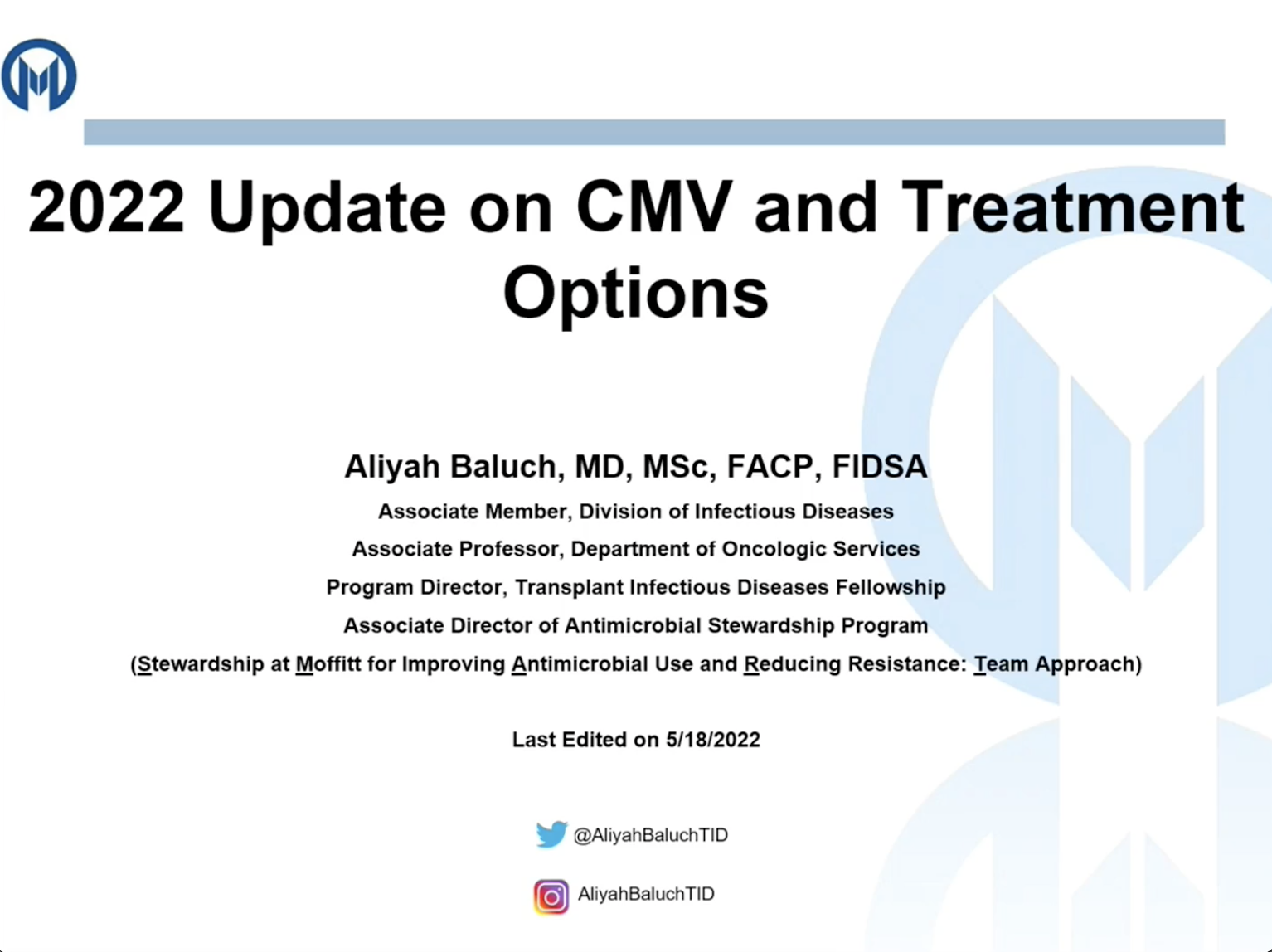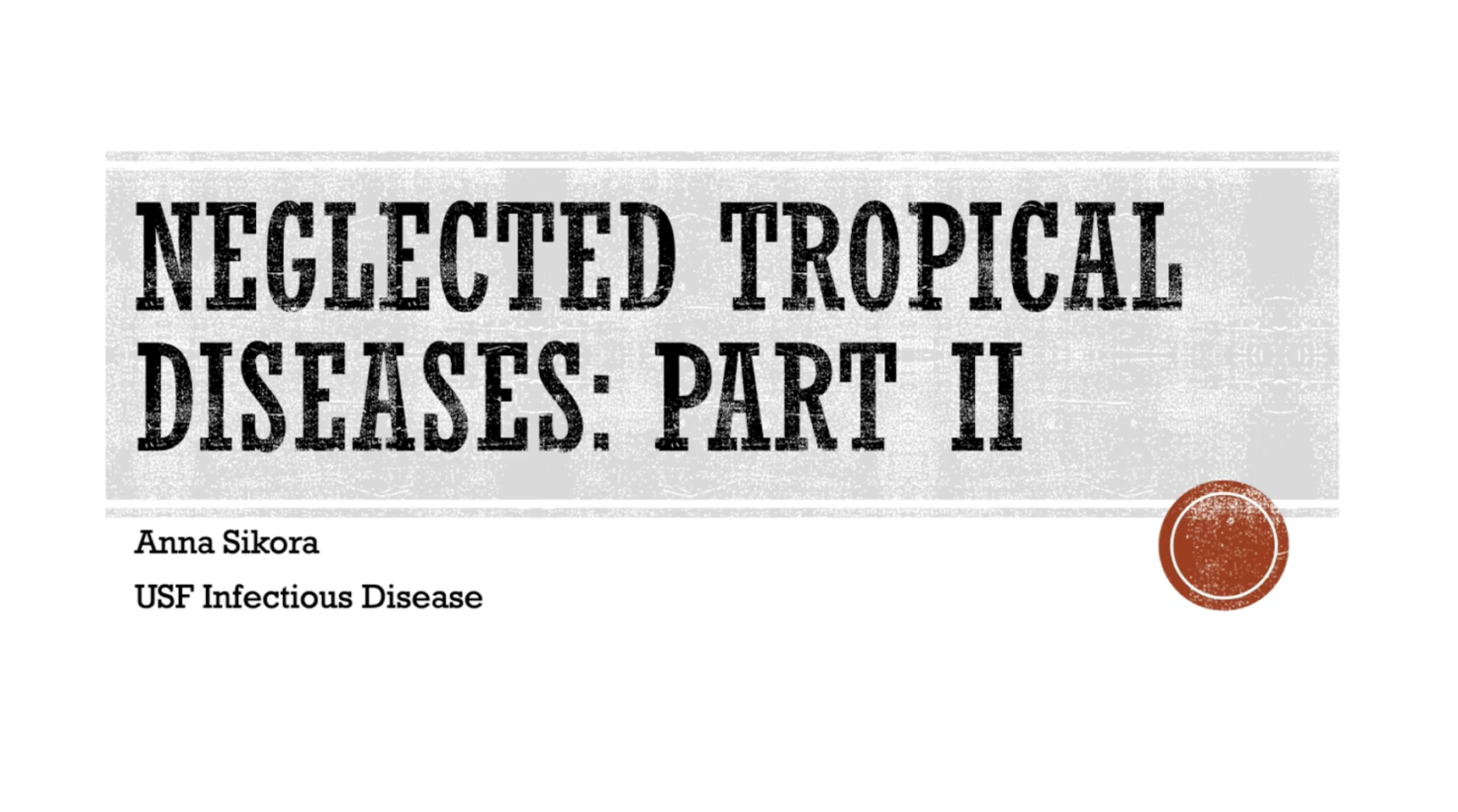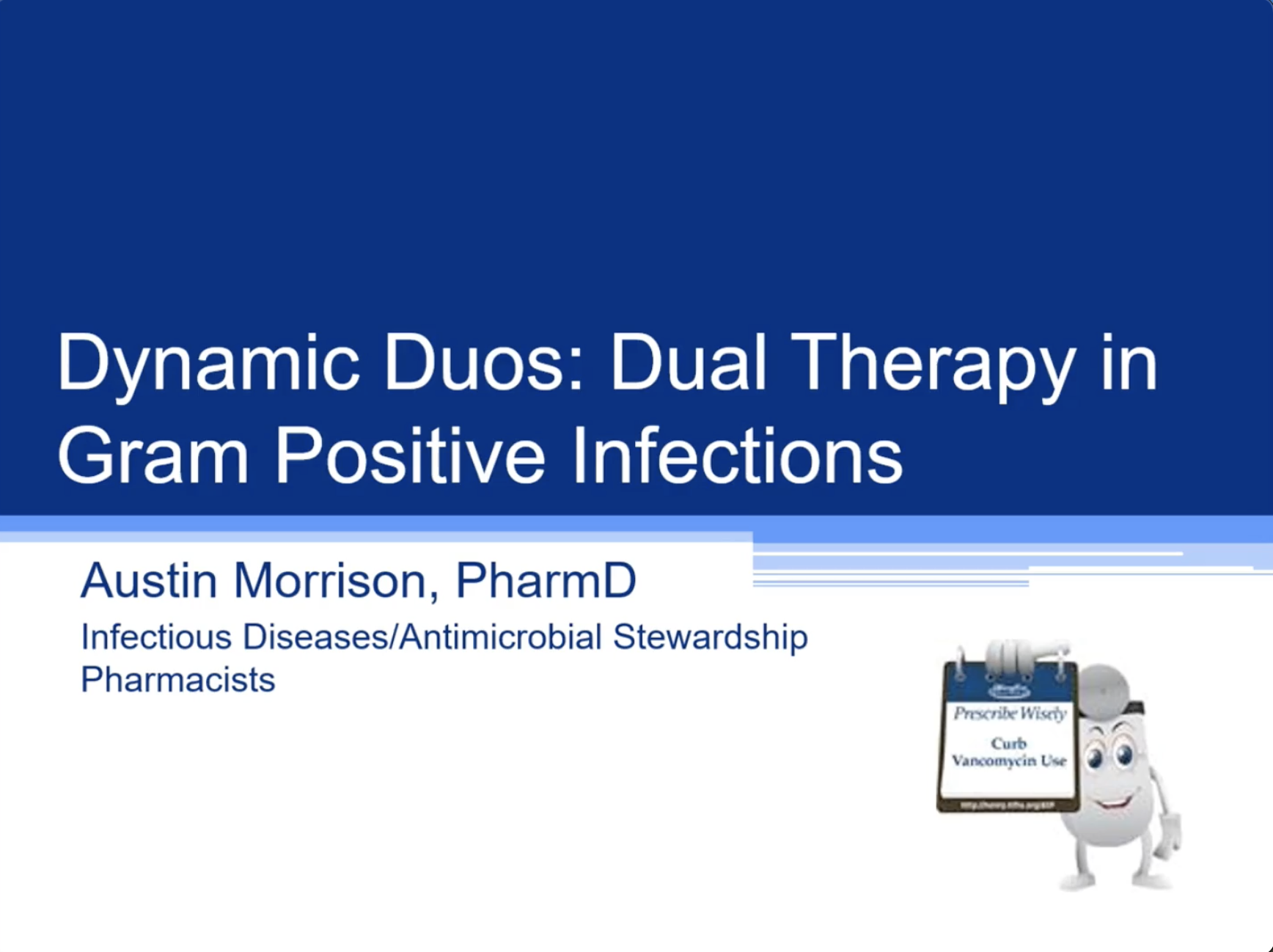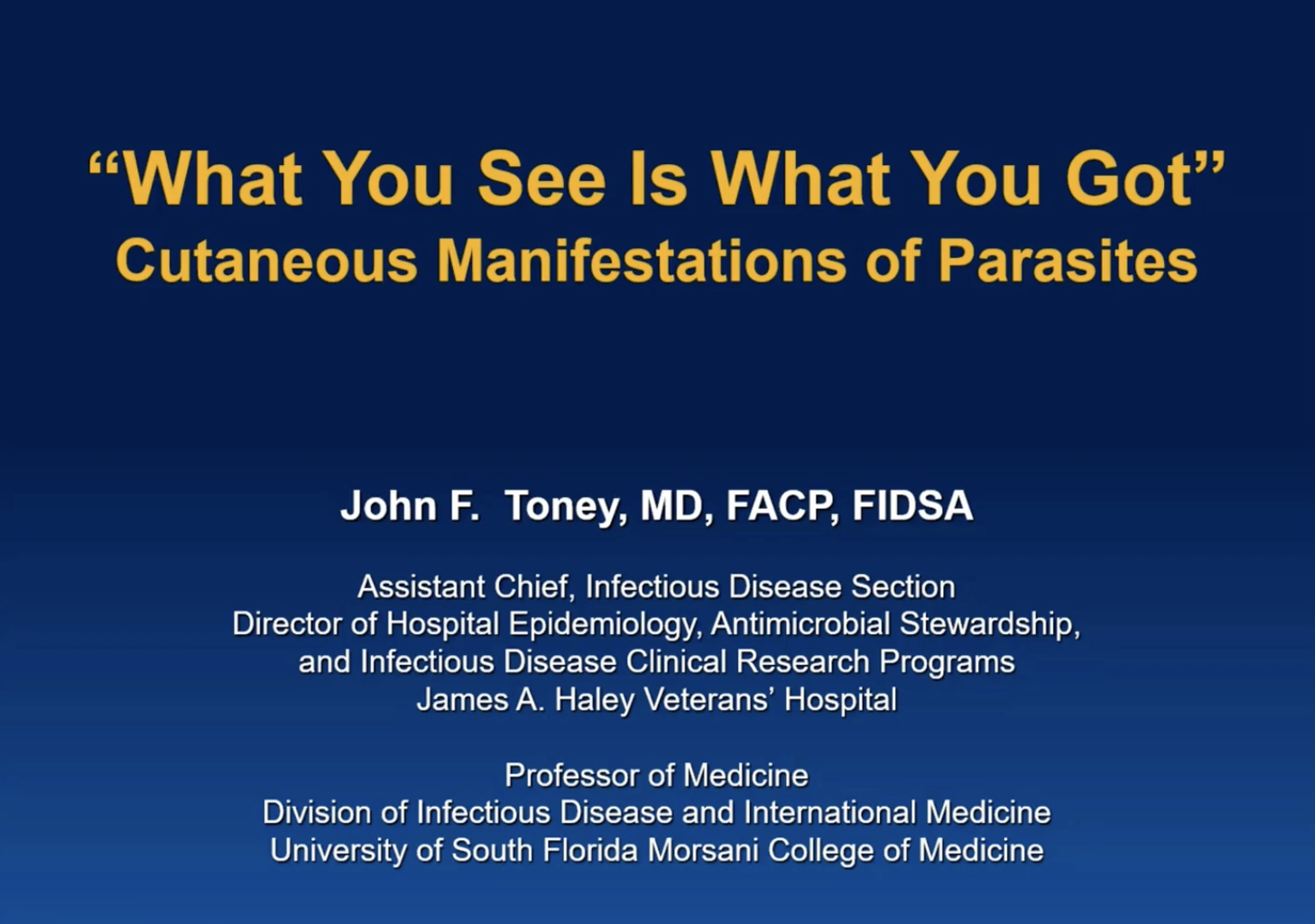Dr. John Toney, Professor of Medicine at the University of South Florida Division of Infectious Diseases, presents an update on Genitourinary tract infections. He begins the presentation by discussing the many manifestations of UTIs, from asymptomatic bacteriuria to cystitis to pyelonephritis. He then differentiates acute uncomplicated and acute complicated cystitis. Next, he discusses acute pyelonephritis, its management and treatment options. More information on the assessment of asymptomatic bacteriuria is also presented. Next, Dr. Toney transitions to discussing updates in the the management and treatment of STI’s including Gonorrhea, Chlamydia, and Syphilis with an emphasis on the recent guidelines updates.
Archives
Update on CMV and Treatment Options for 2022
Dr. Aliyah Baluch, Program Director of the Infectious Diseases Transplant Program at the Moffitt Cancer Center and Research Institute, presents an update on CMV infections in the Immunocompromised host. She begins by discussing the basics of allogeneic stem cell transplantation, including pre-transplant screening and what differentiates a “high risk transplant.” She then provides some background information on Cytomegalovirus, including its clinical manifestations in susceptible patients. Next, Dr. Baluch conveys the phases of infection in stem cell transplant, and identifies the high risk period for CMV disease to typically occur. She then discusses CMV diagnosis, antiviral therapies, and CMV prophylaxis strategies. Dr. Baluch closes by discussing CMV drug resistance as well as several information resources useful in the management of CMV-infected patients.
Neglected Tropical Diseases: Part II
Dr. Ana Sikora, Infectious Diseases Fellow at the University of South Florida Division of Infectious Diseases, presents a review of lesser known tropical infectious diseases syndromes. Dr. Sikora begins by discussing the epidemiology of tropical diseases, and then prioritizes the most important ones based upon WHO categorization. Syndromes discussed includes Drucunculiasis, lymphatic filariasis, Onchocerciasis, soil transmitted helminths, and Schistosomiasis. Lastly, the process by which international organizations such as the WHO coordinate efforts to control or eradicate these syndromes is briefly discussed.
LGBTQ+ Health 101
Dr. Alberto Contreras, Infectious Diseases Fellow at the University of South Florida College of Medicine, presents a primer on medical issues associated with lesbian, bisexual, gay and transgender patients. Dr Contreras begins by discussing the spectrum of those individuals who identify with the LGBTQ community. He then differentiates sexual orientation and gender identity. Next, Dr Contreras covers basic gender grammar. He next discusses health care disparities occurring among this group of patients. Other topics covered during the presentation include substance abuse, care guidelines for LGBT patients, and the effects of hormone therapy.
Dynamic Duos: Dual Therapy for Gram Positive Infections
Dr. Austin Morrison, Infectious Diseases/Antimicrobiaql Stewardship pharmacist at Moffitt Cancer Center and Research Institute, presents a lecture on the use of dual therapy in gram positive infections. Dr. Morrison begins by discussing dual therapy for Staphylococcus aureus infections, and then transitions to discuss similar therapy for Enterococcus faecalis. Dr. Morrison shares information on mechanisms of action, the rationale for dual beta lactams, and the use of daptomycin with beta-lactams.
Syphilis
Dr. Michael Gelfand, Chief of Infectious Diseases at the University of Tennessee Health Sciences Center, discusses the spectrum of Syphilis disease, one of the great mimickers and historical scourges of human kind. Syphilis cases are also seeing a resurgence in recent years, especially in high U.S. prevalence areas such as the midwest, northeast, and south. Syphilis rates are also increasing across the globe in places such as Europe, Russia, and China. Dr. Gelfand begins his talk by discussing the historical origins of Syphilis, including that Treponema pallidum may have been brought back to Europe from the new world by returning explorers. He then provides more information on the epidemiology of Syphilis. Next, Dr. Gelfand talks about the natural progression of Syphilis, from primary disease to its secondary and tertiary forms. The clinical manifestations of syphilis disease are then described. Dr. Gelfand then describes the conundrum of Syphilis testing. Lastly, Dr. Gelfand focuses on tertiary forms of Syphilis, including neurosyphilis. The treatment of various forms of Syphilis is also discussed. From a grand rounds lecture originally recorded on April 14, 2022.
The Use of Procalcitonin as a Diagnostic Marker in Infectious Diseases
Cognitive Bias: Changing the Way We Look at the World
Dr. Oehler, Professor of Medicine at the Division of Infectious Diseases, Morsani College of Medicine, presents a lecture on Cognitive Bias in Medicine. Dr. Oehler begins by comparing and contrasting the different kinds of bias. Next, the author draws a contrast between intuitive and analytical thinking and how cognitive biases result when intuitive thinking is misapplied. Dr. Oehler next explains how intuitive thinking is a necessary, but imperfect tool in medicine. He relates the advantages and disadvantages of using instinctive thinking in medicine. Next a series of 10 clinical vignettes are presented, each demonstrating an important type of cognitive bias in medicine in an interactive format. The speaker concludes his talk with a “lightning round” of other types of cognitive bias that are also important to be aware of.
A Brief History of Vaccination
Dr. Thomas Burkhead, infectious diseases fellow at the University of South Florida, reviews the history of vaccination. He begins by discussing the early history of variolation, perhaps the first technique for immunizing people against a contagious pathogen. He then reviews Edward Jenner and his experiments with cowpox that led to the first vaccine for smallpox. Next, the origins of the “Germ Theory” of infectious diseases is reviewed. Dr. Burkhead then discusses the research of Louis Pasteur and his success with Rabies vaccination. Next, the speaker contrasts innate and adaptive immunity, and explains passive immunization, adjuvants, and the history of development of the polio vaccine. Lastly, Dr. Burkhead reviews the vaccine advances in the latter half of the 20th century and early 21st century, including pneumococcal vaccines, recombinant vaccines, adenovirus vector vaccines, and the recent COVID-19 vaccines.
What You See is What You Got: Cutaneous Manifestations of Parasites
Dr. John Toney, Professor of Medicine at the James A Haley Veterans Hospital, focuses upon infections and infestations of the skin associated with parasites. Topics discussed include scabies, cutaneous larva migrans, human pediculosis, Lyme borreliosis, trypanosomiasis, rickettsial disease, leishmaniasis, bedbugs, and myiasis. From a lecture recorded in January 2022.
